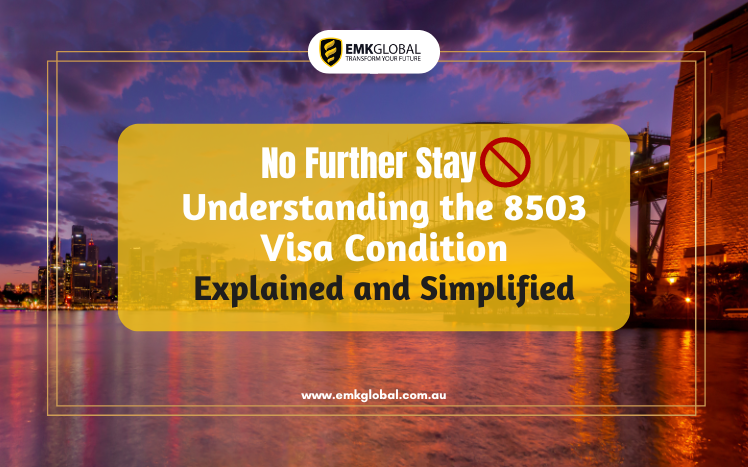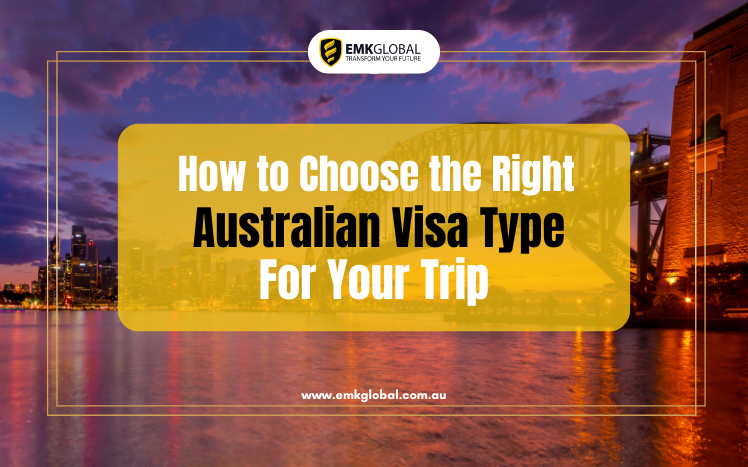What Does the 8503 Visa Condition Mean?
The Australian Government has introduced the “no further stay” 8503 visa condition to regulate visitor visas more strictly. This condition prohibits visa holders from applying for other visas while staying in Australia, except for a protection visa.
Introduction to the 8503 Visa Condition
The 8503 visa condition is designed to prevent the misuse of visitor visas for purposes such as bypassing offshore student visa checks. This article explores the implications of this condition for individuals planning to migrate or study in Australia.
Purpose of Implementing the 8503 Visa Condition
In 2024, the Australian Government aims to enhance the integrity of student visas by restricting the conversion of tourist visas to student visas within Australia. This measure is crucial to maintain the integrity of the visa system and ensure that individuals comply with the intended purposes of their visas.
Impact on Migratory Plans
For those considering migration or studying in Australia, the imposition of the 8503 visa condition necessitates a reevaluation of their plans. The inability to convert tourist visas to student visas within Australia requires a different approach to visa applications and migrations.
Understanding the 8503 Visa Condition
The 8503 visa condition explicitly states that visa holders cannot apply for substantive visas other than protection visas while in Australia. This limitation underscores the government’s efforts to streamline visa processes and prevent unauthorized stays.
Definition
The 8503 visa condition, also known as “no further stay,” sets clear boundaries on visa holders’ ability to extend their stay or change visa types within Australia.
Scope of Limitations
Visa holders under the 8503 condition cannot seek extensions or alterations to their visa status, except under specific circumstances.
Reasons for Imposing the 8503 Visa Condition
One of the primary reasons for imposing the 8503 visa condition is to ensure that visa applicants demonstrate strong ties to their home countries. This requirement helps assess the genuineness of their intentions and prevents misuse of visa privileges.
Lack of Substantial Ties
Individuals with insufficient connections to their home countries are more likely to face the 8503 visa condition, highlighting the importance of establishing substantial ties for successful visa applications.
Importance of Demonstrating Genuine Intentions
To avoid the 8503 visa condition, applicants must showcase genuine temporary entry intentions and a commitment to complying with visa regulations.
Visa Types Subject to 8503 Visa Condition
Several visitor and temporary residency visas fall under the discretionary imposition of the 8503 visa condition, with some visa types mandatorily subject to this restriction.
- Tourist visa (subclass 676)
- Sponsored Family Visitor visa (subclass 679)
- Sponsored Business Visitor visa (subclass 459)
- Professional Development visa (subclass 470)
- Work and Holiday visa (subclass 462) for those with two previous subclass 462 visas.
How to Identify the Presence of 8503 Visa Condition
Applicants can check their visa status and conditions through the Visa Entitlement Verification Online (VEVO) program, where the presence of the 8503 condition is indicated on the approval letter.
Limitations and Exceptions
Conversion Restrictions
Under the 8503 visa condition, converting a tourist visa to a student visa within Australia is prohibited. Applicants must depart Australia and apply for a student visa offshore.
Waiver Possibilities
In exceptional circumstances, applicants can request a waiver for the 8503 visa condition, citing reasons such as health conditions, family emergencies, or country-specific issues.
Requesting a Waiver for 8503 Visa Condition
To request a waiver, applicants must submit Form 1447 with detailed justification and supporting documents. While waivers are possible, they are granted based on specific criteria and situations.
Alternatives and Legal Implications
Navigating the complexities of visa conditions and waivers often requires professional legal advice to ensure compliance and avoid legal issues. Seeking assistance from immigration lawyers can clarify options and mitigate risks.
Professional Assistance and Legal Advice
For individuals facing challenges related to visa conditions, seeking professional advice from immigration experts is crucial. Legal guidance can help navigate complex processes, improve chances of success, and address potential legal consequences.
Conclusion
The 8503 visa condition significantly impacts individuals planning to migrate or study in Australia, necessitating a thorough understanding of visa regulations, limitations, and waiver possibilities. By adhering to visa requirements, demonstrating genuine intentions, and seeking professional guidance when needed, applicants can navigate the visa process effectively and mitigate legal risks.
FAQs
- Can I change my tourist visa to a student visa in Australia if it has the 8503 condition?
- No, under the 8503 condition, converting a tourist visa to a student visa within Australia is not permitted.
- What are the circumstances under which I can request a waiver for the 8503 visa condition?
- Waivers for the 8503 condition may be considered under specific situations such as health emergencies, family crises, or country-specific issues.
- What happens if my waiver request for the 8503 visa condition is denied?
- If a waiver request is denied, applicants may explore legal avenues for review, but outcomes depend on individual circumstances.
- Is it guaranteed that I can apply for another visa if the 8503 condition is waived?
- Waiving the 8503 condition doesn’t guarantee approval for another visa; additional factors and compliance with visa regulations are crucial.
- What should I do if I face legal issues while seeking a waiver for the 8503 visa condition?
- Seek professional legal advice promptly to address legal issues, understand rights, and navigate visa processes effectively.



